Klotho Protein Protects Brains of ALS Mice, Study Suggests

The klotho protein may have brain-protecting effects in amyotrophic lateral sclerosis (ALS), according to a study in mice that may become a basis for developing new therapies.
The study, “Klotho Is Neuroprotective in the Superoxide Dismutase (SOD1G93A) Mouse Model of ALS,” was published in the Journal of Molecular Neuroscience.
The protein Klotho has a number of interesting properties. It is an antioxidant and an anti-inflammatory molecule, can protect brain cells, and also helps promote myelination (the addition of myelin, which is the “sheath” around neurons that is critical for their health).
Researchers at the Boston University School of Medicine had shown previously that increasing the expression of this protein was beneficial in mouse models of Alzheimer’s disease and multiple sclerosis.
Now, researchers used SOD1 mutant mice (a model of ALS) to observe the effect of klotho in this disease. They engineered some of these mice to express higher levels of the protein, and observed the differences between mice with and without this overexpression.
In klotho-overexpressing mice, disease onset and progression was delayed and survival was extended for more than a week. Notably, these effects were more evident in female than male mice.
More klotho also led to less neuron loss, particularly in the spinal cord, and improved the animals’ performance in the grip strength test.
Additionally, klotho-overexpressing mice had less inflammation in their brains (as assessed by levels of pro-inflammatory signaling molecules), but they had higher expression of antioxidant and pro-myelination factors.
“Our data provide strong evidence that enhancing Klotho expression in an ALS mouse model is neuroprotective. These results strengthen and add new support to our previous reports demonstrating the neuroprotective roles Klotho plays generally in the brain and in AD and MS mouse models and paves the way to explore new therapeutics for neurodegenerative diseases in the form of Klotho enhancing small molecules or Klotho gene therapy,” the authors wrote.
“We now show that Klotho is also neuroprotective in an ALS model,” Carmela Abraham, PhD, a professor at Boston University School of Medicine and co-author of the study, said in a press release. “Thus, increasing Klotho levels would be a logical treatment for age-related neurodegenerative and neuroinflammatory diseases.”
Abraham added, “We propose that increasing the levels of the Klotho protein would significantly alleviate the neurologic manifestations, improve the quality of life and prolong life span in patients with ALS. If one was to extrapolate the results of this study, increasing Klotho by only 50 percent would prolong life by approximately 300 days.”
Although pharmacological treatments targeted at increasing klotho levels are pretty much still a thought experiment, there is evidence that anything that increases this protein may have these protective effects. For example, exercise has been demonstrated to increase klotho levels.
“This may be relevant for healthy individuals or patients newly diagnosed with ALS,” Abraham said. “Additionally, in the cases of familial ALS, family members who wish to be tested and discover that they are carriers of an ALS gene could start exercising or start Klotho boosting therapy, once it becomes available.”






